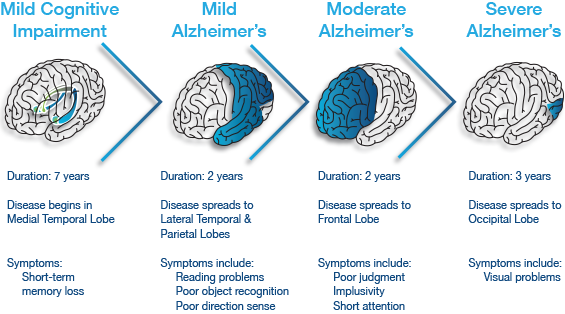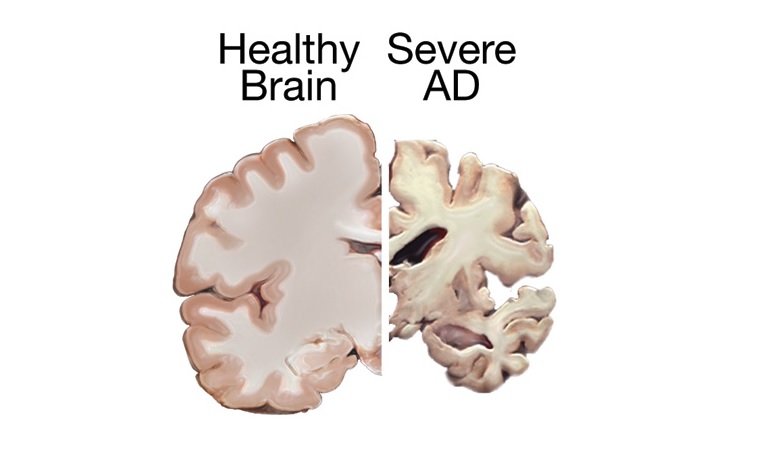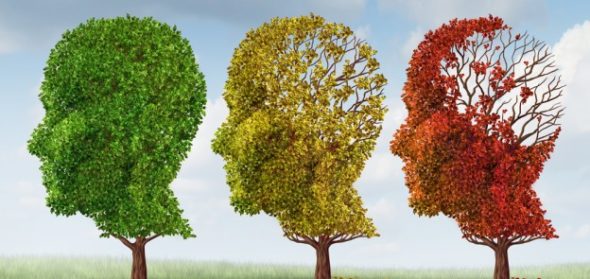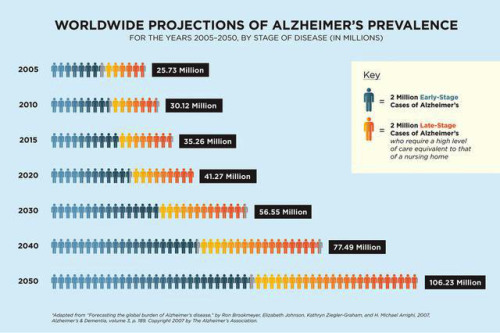 Alzheimer’s disease is an irreversible, progressive brain disorder that slowly destroys memory and thinking skills, and eventually the ability to carry out the simplest tasks. Alzheimer’s is a type of dementia that causes problems with memory, thinking and behavior. Symptoms usually develop slowly and get worse over time, becoming severe enough to interfere with daily tasks.
Alzheimer’s disease is an irreversible, progressive brain disorder that slowly destroys memory and thinking skills, and eventually the ability to carry out the simplest tasks. Alzheimer’s is a type of dementia that causes problems with memory, thinking and behavior. Symptoms usually develop slowly and get worse over time, becoming severe enough to interfere with daily tasks.
Symptoms
The most common early symptom of Alzheimer’s is difficulty remembering newly learned information.
Just like the rest of our bodies, our brains change as we age . Most of us eventually notice some slowed thinking and occasional problems with remembering certain things. However, serious memory loss, confusion and other major changes in the way our minds work may be a sign that brain cells are failing.
The most common early symptom of Alzheimer’s is difficulty remembering newly learned information because Alzheimer’s changes typically begin in the part of the brain that affects learning. As Alzheimer’s advances through the brain it leads to increasingly severe symptoms, including disorientation, mood and behavior changes; deepening confusion about events, time and place; unfounded suspicions about family, friends and professional caregivers; more serious memory loss and behavior changes; and difficulty speaking, swallowing and walking.
 People with memory loss or other possible signs of Alzheimer’s may find it hard to recognize they have a problem. Signs of dementia may be more obvious to family members or friends. Anyone experiencing dementia-like symptoms should see a doctor as soon as possible. At International Modern Hospital, we offer specialised care for such patients under the guidance of our psychiatrist, Dr. Shaju George
People with memory loss or other possible signs of Alzheimer’s may find it hard to recognize they have a problem. Signs of dementia may be more obvious to family members or friends. Anyone experiencing dementia-like symptoms should see a doctor as soon as possible. At International Modern Hospital, we offer specialised care for such patients under the guidance of our psychiatrist, Dr. Shaju George

Alzheimer’s is not the only cause of memory loss.
Many people have trouble with memory — this does NOT mean they have Alzheimer’s. There are many different causes of memory loss. If you or a loved one is experiencing symptoms of dementia, it is best to visit a doctor so the cause can be determined.
The role of plaques and tangles
Plaques and tangles tend to spread through the cortex as Alzheimer’s progresses.
Two abnormal structures called plaques and tangles are prime suspects in damaging and killing nerve cells.
 Plaques are deposits of a protein fragment called beta-amyloid (BAY-tuh AM-uh-loyd) that build up in the spaces between nerve cells.
Plaques are deposits of a protein fragment called beta-amyloid (BAY-tuh AM-uh-loyd) that build up in the spaces between nerve cells.
Tangles are twisted fibers of another protein called tau (rhymes with “wow”) that build up inside cells.
Though most people develop some plaques and tangles as they age, those with Alzheimer’s tend to develop far more. They also tend to develop them in a predictable pattern, beginning in areas important for memory before spreading to other regions.
Scientists do not know exactly what role plaques and tangles play in Alzheimer’s disease. Most experts believe they somehow play a critical role in blocking communication among nerve cells and disrupting processes that cells need to survive.
It’s the destruction and death of nerve cells that causes memory failure, personality changes, problems carrying out daily activities and other symptoms of Alzheimer’s disease.
Diagnosis of Alzheimer’s Disease

Doctors use several methods and tools to help determine whether a person who is having memory problems has “possible Alzheimer’s dementia” (dementia may be due to another cause) or “probable Alzheimer’s dementia” (no other cause for dementia can be found).
To diagnose Alzheimer’s, doctors may:
- Ask the person and a family member or friend questions about overall health, past medical problems, ability to carry out daily activities, and changes in behavior and personality
- Conduct tests of memory, problem solving, attention, counting, and language
- Carry out standard medical tests, such as blood and urine tests, to identify other possible causes of the problem
- Perform brain scans, such as computed tomography (CT), magnetic resonance imaging (MRI), or positron emission tomography (PET), to rule out other possible causes for symptoms.
These tests may be repeated to give doctors information about how the person’s memory and other cognitive functions are changing over time.
Alzheimer’s disease can be definitely diagnosed only after death, by linking clinical measures with an examination of brain tissue in an autopsy.
Treatment of Alzheimer’s Disease
Alzheimer’s disease is complex, and it is unlikely that any one drug or other intervention can successfully treat it. Current approaches focus on helping people maintain mental function, manage behavioral symptoms, and slow or delay the symptoms of disease. Researchers hope to develop therapies targeting specific genetic, molecular, and cellular mechanisms so that the actual underlying cause of the disease can be stopped or prevented.
